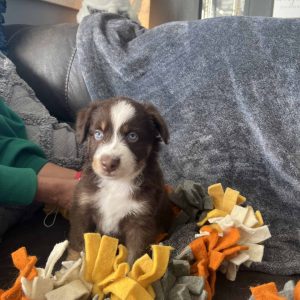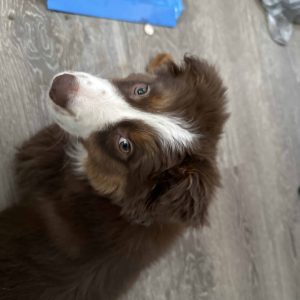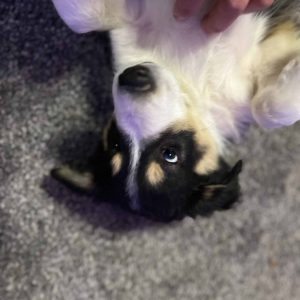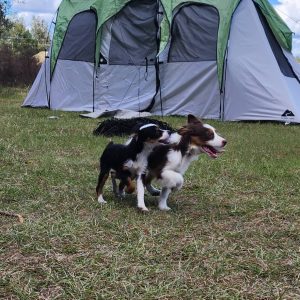Australian Shepherd
Showing 33–36 of 36 results
Temperament
Australian Shepherds were bred to deal mainly with livestock, not humans. However, they still get along very well with family members and other dogs. They can be a little shy around strangers, but do not tend to be aggressive. When an Australian Shepherd is given work to do or games to play, they come alive with an energy that is a sight to behold. They direct livestock like a general marshalling an army for battle, and bring the same intensity and focus to competitive sports. Despite this commanding presence on the field, at home a well-socialized and well-exercised Australian Shepherd is a sweet and gentle companion. They’re protective of their household and the humans under their care. They dislike downtime, so they’ll constantly be looking for games to play with you.The Ultimate Guide to Australian Shepherd
Origins
The origins of the Australian Shepherd are somewhat convoluted. Despite the name, this breed actually rose to prominence in America as a sheep herding dog. Western states had an influx of sheep from Australia in the mid-19th century, and the immigrant shepherds brought along their dogs to keep the sheep in line. The Americans dubbed these energetic, intelligent, and loyal dogs the Australian Shepherd, a name that would eventually spread to almost all merle sheepdogs in the western states. The imported sheepdogs would breed with the existing sheepdogs derived from British stock, resulting in the modern Australian Shepherd we know today. Aussies have become one of the most popular dog breeds in the world, and can be found on ranches and farms almost everywhere. Their work ethic and loyalty to their owners continue to be desirable traits for anyone needing an excellent herding dog.
Key Characteristics of Australian Shepherd
| Australian Shepherd | Australian Shepherds were bred to deal mainly with livestock, not humans. However, they still get along very well with family members and other dogs. They can be a little shy around strangers, but do not tend to be aggressive.
When an Australian Shepherd is given work to do or games to play, they come alive with an energy that is a sight to behold. They direct livestock like a general marshalling an army for battle, and bring the same intensity and focus to competitive sports. Despite this commanding presence on the field, at home a well-socialized and well-exercised Australian Shepherd is a sweet and gentle companion. They’re protective of their household and the humans under their care. They dislike downtime, so they’ll constantly be looking for games to play with you. |
| Exercise Needs | The Australian Shepherd is the energizer bunny of dog breeds. Like most herding dogs, they’re meant to be out with their owner from the crack of dawn until the work is done. They thrive on this work and are happiest when they have a task to perform.
Because of these over-the-top energy levels, Australian Shepherds need multiple hours of exercise and play each day. Working Aussies will have more than enough stimulation through their daily activities. An hour-long walk, a 30-minute play and training session, and another 30-minute off-leash session in a fenced yard should just about begin to tire out most Australian Shepherds.
Apart from physical stimulation, they also need significant amounts of mental stimulation. Keep challenging dog games and puzzles handy to keep them occupied if you must leave them alone for any length of time. If you don’t give your Australian Shepherd a task, they’re going to invent one for themselves – and you may not enjoy what they choose to do. |
| Australian Shepherd Grooming | As an outdoor working dog, the Australian Shepherd was bred to have a coat that protects it from adverse weather. They have a thick double coat, featuring a wavy medium-length top coat and a dense undercoat. The top coat is water resistant, while the undercoat provides insulation against the cold.
Like most other double-coated dogs, the Australian Shepherd will “blow coat” when the seasons change – typically going from winter to spring, when dogs lose their winter coat. This will be a veritable storm of fur, so deshedding the dog before this happens can help mitigate some of the shedding. Regular brushing throughout the rest of the year is advisable, around two to three times a week.
Most Australian Shepherds don’t need to be bathed very often, as their water-resistant coat tends to keep them clean. If you do bathe your Aussie, use dog-specific shampoo so that their skin and fur don’t end up dry. Tooth brushing regularly is a must to prevent tooth and gum diseases, preferably daily. Working Aussies will have their nails worn down naturally, but Aussies kept as house pets may need trimming around once a month. |
| Australian Shepherd Training | As born working dogs, Australian Shepherds are eager to please their owners and are relatively easy to train. They have seen success in numerous dog sports, from agility courses to freestyle. Early training and socialization is a must for this breed as it tends to be wary of strangers.
They’re sensitive animals, meaning they can be thrown off by inconsistencies in training. Novice dog owners may want to consider enrolling in a dog training course so that they can learn alongside their Aussie.
Apart from basic obedience training, Australian Shepherds have the ability to perform incredibly complex tasks. Keeping your dog engaged with skills and tricks throughout their life will be the best way to keep their minds sharp.
Australian Shepherds tend to respond best to positive reinforcement, such as treats, praise, and toys. |
| Australian Shepherd Lifespan And Health Issues | Australian Shepherds have an above-average lifespan for dogs of their size, living for 12 to 16 years. Australian Shepherds may be prone to:
|
| Australian Shepherd Size And Space Requirements | Australian Shepherds aren’t overly large, and are actually somewhat slim for how tall and long they can get. They weren’t bred for strength and power, but rather for agility and endurance. They stand between 18 to 23 inches tall at the shoulder and can weigh between 45 to 65 pounds.
Australian Shepherds don’t need too much space, despite their energy levels. They do need a fenced outdoor area where they can run around and play, so they aren’t well-suited for apartments. However, a moderately sized home can still be comfortable for most Australian Shepherds so long as you are able to provide an outdoor play area.
Because Australian Shepherds are closely bonded to their owners and family, they prefer to sleep indoors. |
Other considerations:
- Australian Shepherds are alert watchdogs and will bark when strangers approach their property.
- Australian Shepherds will naturally herd anything – including the owner and their family. Early socialization and training are necessary to teach them that this behavior has a time and a place.
- Australian Shepherds can be very vocal if left unattended for long periods of time.
How can I take good care of my Australian Shepherd or Puppy?
Proper socialization
Australian Shepherds have a strong instinct to perform herding actions and their high intelligence can make them mischievous. It is important to socialize your Australian Shepherd puppy as soon as possible so that they grow up to be well-behaved and easygoing. While most puppies will be released to new owners at around 8 weeks old, it is possible to do socialization work in your own home while waiting for the puppy to complete their vaccinations.
Proper nutrition
Australian Shepherds are high-energy working dogs, so it’s important to get them high-quality, premium dog food. A good idea is to weigh out your dog’s food so that you can be sure they’re getting the right amount each day. For specific amounts, consult your veterinarian so they can give a recommendation based on your dog’s health and expected adult weight.
Up-to-date vaccinations
Upon taking home your Australian Shepherd puppy, you should contact your veterinarian to get a vaccination schedule. Vaccination schedules will vary depending on the prevalence of common transmissible dog diseases in your area. Follow this schedule to the best of your ability so that your dog is protected.
Most Asked Australian Shepherd Questions
-
+How Much do Australian Shepherd Puppies Cost



